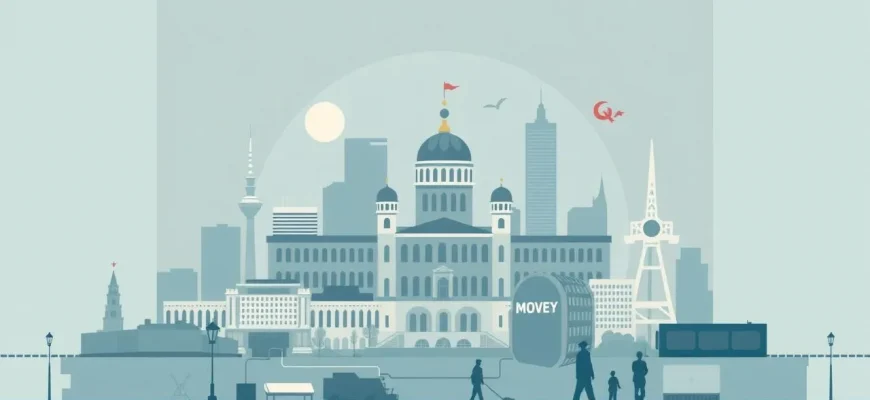- The Twelve Chairs (1971)
- The Diamond Arm (1969)
- The Irony of Fate, or Enjoy Your Bath! (1975)
- Gentlemen of Fortune (1971)
- The Golden Calf (1968)
- The Garage (1979)
- The Adventures of a Dentist (1965)
- The Unusual Adventures of Karik and Valya (1987)
- The Meeting Place Cannot Be Changed (1979)
- The Station Master (1972)
Soviet cinema often explored themes of money, wealth, and financial struggles, reflecting the societal values and economic conditions of the time. This curated list of 10 films offers a unique glimpse into how money was portrayed in Soviet films, providing both entertainment and a historical perspective on the USSR's economic landscape. From comedies to dramas, these films showcase the multifaceted relationship between Soviet citizens and their finances.

The Twelve Chairs (1971)
Description: Based on Ilf and Petrov's novel, this film follows a con artist and a former aristocrat in their quest for hidden jewels, satirizing the obsession with wealth in Soviet society.
Fact: The film was so popular that it inspired several remakes and adaptations in different countries.
 30 Days Free
30 Days Free 
The Diamond Arm (1969)
Description: This comedy follows a regular Soviet citizen who unwittingly becomes involved in a smuggling operation. The film humorously critiques the allure of wealth and the lengths people will go to acquire it.
Fact: The film was one of the highest-grossing Soviet movies of all time and has become a cultural phenomenon in Russia.
 30 Days Free
30 Days Free 
The Irony of Fate, or Enjoy Your Bath! (1975)
Description: While not directly about money, this beloved New Year's Eve comedy touches on themes of materialism and the Soviet dream of owning an apartment, which was a significant financial goal for many.
Fact: The film is traditionally watched by millions of Russians every New Year's Eve, making it a cultural staple.
 30 Days Free
30 Days Free 
Gentlemen of Fortune (1971)
Description: This comedy revolves around a kindergarten teacher mistaken for a criminal mastermind, highlighting the absurdity of wealth and the criminal underworld's fascination with it.
Fact: The film was shot in the real-life city of Bukhara, Uzbekistan, adding an exotic backdrop to the Soviet-era setting.
 30 Days Free
30 Days Free 
The Golden Calf (1968)
Description: Another adaptation of Ilf and Petrov's work, this film continues the adventures of Ostap Bender, focusing on his schemes to get rich quick, offering a satirical look at the pursuit of money.
Fact: The character of Ostap Bender has become an iconic figure in Russian literature and cinema.
 30 Days Free
30 Days Free 
The Garage (1979)
Description: This dark comedy explores the lengths to which Soviet citizens would go to secure a parking space, reflecting the scarcity and value of personal property.
Fact: The film was directed by Eldar Ryazanov, known for his satirical take on Soviet life.
 30 Days Free
30 Days Free 
The Adventures of a Dentist (1965)
Description: This film delves into the life of a dentist who faces moral dilemmas when he encounters a wealthy patient, showcasing the ethical considerations around money and profession.
Fact: The film was one of the first Soviet films to openly discuss the issue of private practice versus state-run healthcare.
 30 Days Free
30 Days Free 
The Unusual Adventures of Karik and Valya (1987)
Description: While primarily a children's film, it includes themes of wealth and the desire for material possessions through the adventures of two kids who shrink themselves to explore the world.
Fact: The film was based on a popular Soviet children's book, adding a layer of nostalgia for many viewers.
 30 Days Free
30 Days Free 
The Meeting Place Cannot Be Changed (1979)
Description: This crime series, while not exclusively about money, features characters motivated by greed and the pursuit of wealth, reflecting the darker side of financial ambition.
Fact: The series was so popular that it led to a sequel and has been remade several times.
 30 Days Free
30 Days Free 
The Station Master (1972)
Description: This film adaptation of Pushkin's story subtly explores themes of wealth and social status through the life of a humble station master and his daughter.
Fact: The film was part of a series of adaptations of Pushkin's works, showcasing the literary heritage of Russia.
 30 Days Free
30 Days Free 








